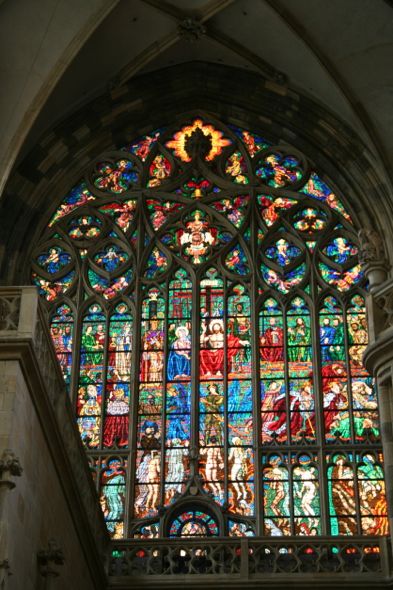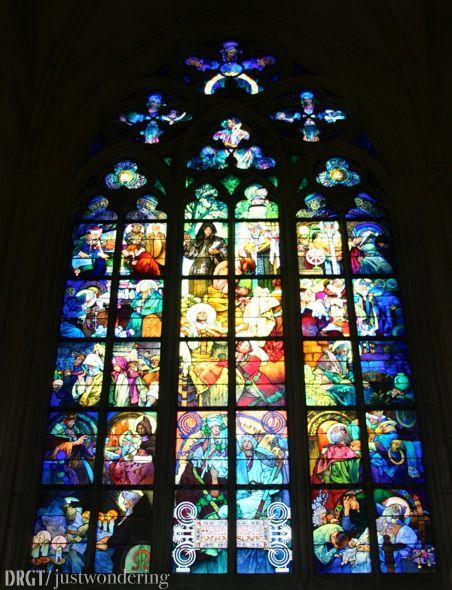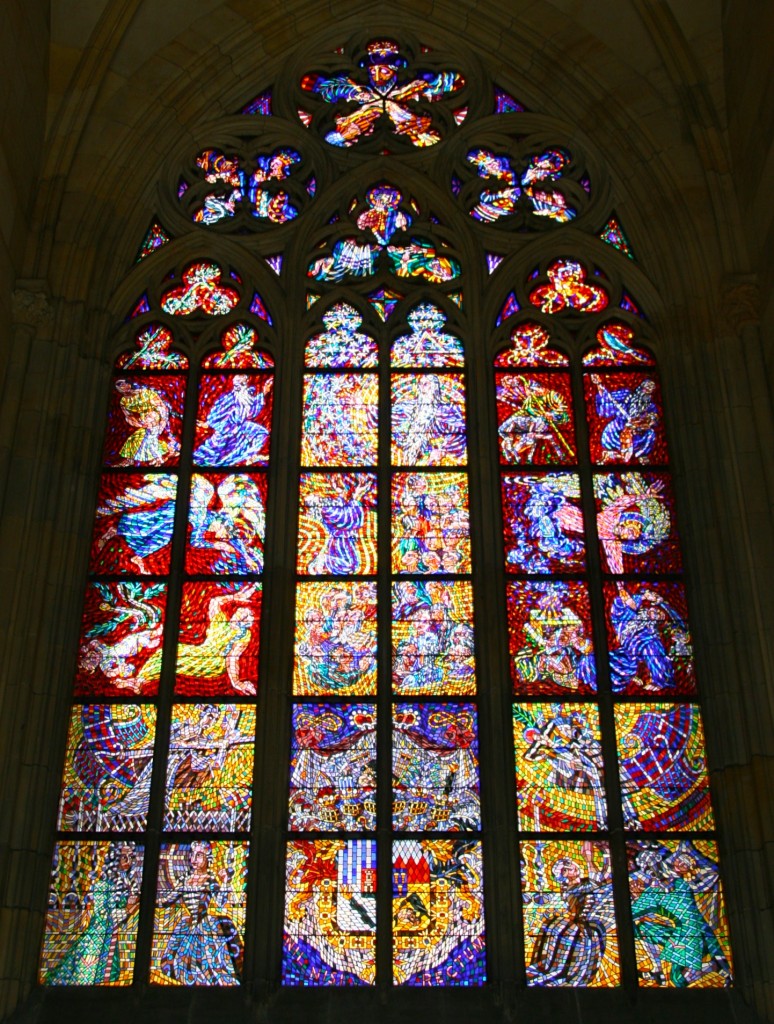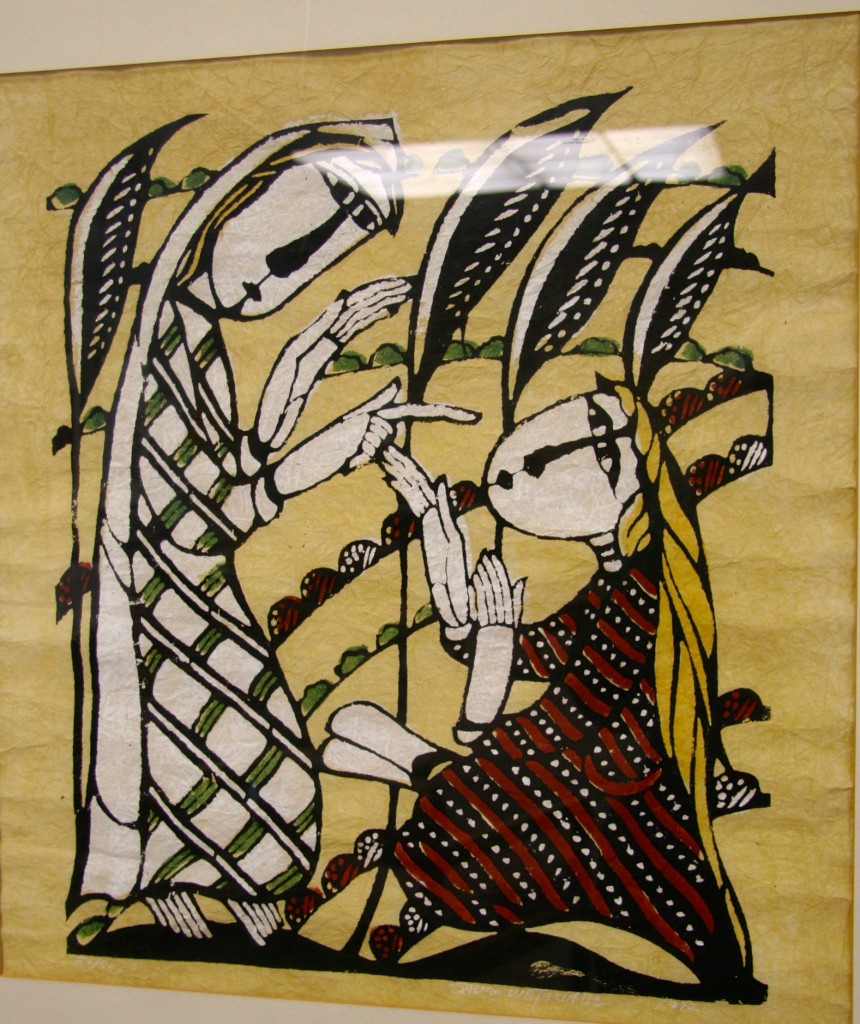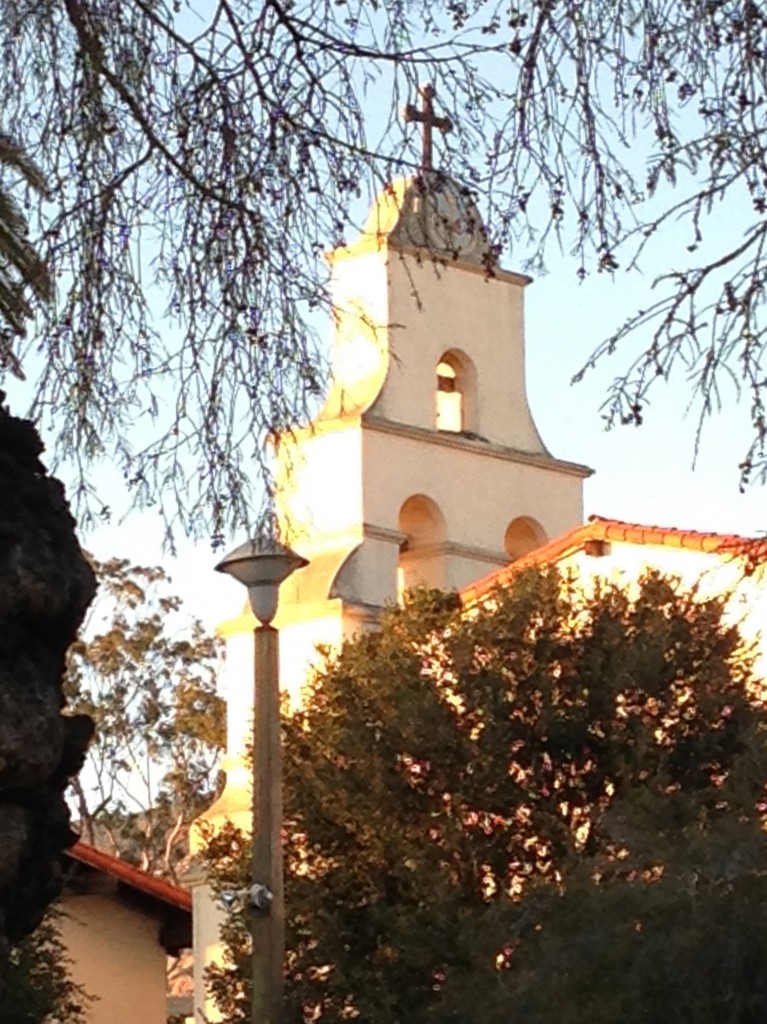This sermon was preached 11 years ago as part of a series on creating ‘margin’ in our lives. Three of us preached in this series — on economics, relationships, time. And when my turn came, the topic was a tough one for me: honoring these bodies we’ve been given by caring for them well, including making space for Sabbath. It was preached during Advent and used one of the Isaiah Advent texts as its primary focus. And it was preached at the end of a very difficult year for me personally. I had been on an extended medical leave from January-August and the story I tell happened during those months.
Each week’s photo is from a collection of pictures taken in St. Vitus’ Cathedral, Prague.
Let Every Heart Prepare Him Room
preached by Diana R.G. Trautwein
Montecito Covenant Church
Advent Series, December 15, 2002
“Making Ready: Is There Space for God in Our Bodies?”
I never cease to be amazed at God’s sense of humor. I am perhaps the last person who should be standing up here in front of you all, giving you a pep talk on taking care of your bodies. Because I’m doing a really lousy job of it at the moment and actually, to be honest, have done a really lousy job of it for most of my life. And lots of people that I talk to, church people, followers of Jesus Christ, tell me the same thing.
Why do you think that’s true? Why do you think we let our lives run right out to the edge of the page physically? Is there something we should be doing (or not doing!) that we’ve lost the knack for? Is there something we should know that we have forgotten?
Our text for this morning offers some helpful ideas. This beautiful poem from the prophet Isaiah has been read as part of the celebration of Advent for hundreds of years. And I believe that it (and a couple of other admonitions in scripture) can point us in the right direction as we reflect together on what it means to live our lives with physical margin.
I want to make something crystal clear as we begin this morning: to be a follower of Jesus Christ means that everything we are and everything we do is to be set inside the sphere of his Lordship. Jesus did not come to Bethlehem, to be born in isolation, homelessness, and poverty so that he could establish yet another religion, another set of rules about sacred and profane.
Jesus came – as a baby born of a very human mom, as a young boy filled with curious questions, making messes, laughing, crying, eating, sleeping, dreaming; as a grown man, learning a trade, living in community, walking the dusty roads of Palestine, catching fish and catching people — Jesus came to save us, to bring rich meaning to our very human living, to show us what margin looks like in day-to-day life, long before the term ‘margin’ was ever coined.
Jesus came to call us to God, to point us to truth, to walk the way of holiness in our midst. And every bit of Jesus’ coming speaks loudly and clearly to the worth and value of human life, of physical life as well as spiritual life. By choosing to wear human flesh for 33 years, Jesus of Nazareth gave new meaning to our understanding of what this flesh means.
These bodies, my friends, are the place where we meet God, where we receive God’s grace, where we live the life granted to us on this earth. And they are precious gifts. No matter what shape they are in. No matter what we or anyone else thinks they look like. No matter what our culture tells us they should look like. No matter what the ravages of age or disease may do to them.
No matter what.
They are gifts and they are temples. There is no sense of our bodies, in and of themselves, being outside the range of God’s saving grace. Now what we choose to do with these bodies can be, and often is, anything but sacred. In fact, we can choose to profane these gifts rather royally. But the bodies themselves are hallowed, sacred and splendid, God’s chosen dwelling place through the grace of Jesus and the power of the Holy Spirit. Therefore, what we do to and with our bodies is of primary importance and is not to be ignored.
Somewhere along the way, a whole bunch of us Christians got the idea that the body is somehow disconnected from our spiritual life, that it is of little or no value to God, that only what happens between our ears or in our hearts is important.
It just ain’t so, and the whole scope of scripture gives testimony to this truth.
Isaiah recognizes it here, in his word picture about the coming of God. This beautiful poem is a vision on many levels – it speaks to the people to whom it was written – the Israelites living in exile and hoping for a better future; it speaks to the Jewish people who read it hundreds of years after it was written – nurturing their desire for the Messiah, who would bring about the glorious era pictured here; it speaks to us, followers of Jesus in 2002, who see in these words a description of the in-breaking kingdom of God, made real on earth by Jesus’ first coming and being brought to full fruit with Jesus’ second coming somewhere further out in the future.
It speaks to mind, spirit and body: “Strengthen the weak hands, and make firm the feeble knees,” the prophet cries. Tell them this good news: “The eyes of the blind shall be opened, and the ears of the deaf unstopped; then the lame shall leap like a deer, and the tongue of the speechless sing for joy.” The body and the spirit are redeemed, ransomed by the glorious salvation of God.
This beautiful chapter is a vivid picture of what life can and will be like for all of those who choose to put their trust in God, who choose to let God be God – no thing or no one else. The desert turned to a pool-filled garden, human bodies restored to their creation design, harmony between humanity and the animal world and the created order, the joyous praises of God’s people resounding throughout – that is what is promised to those who choose to find their strength, their hope, their joy in God.
Ok. So it’s a beautiful picture. Sounds great – wish I was there. In the meantime, how do I live in the now? How do I manage these tired hands and these feeble knees? While I’m waiting for Jesus to bring in the kingdom in all of its fullness, is there any way for me to experience just a taste of it in the present?
Yes, as a matter of fact, I believe there is. As I read and reflected on this picture, this passage, over the past couple of weeks, I also did some other kinds of reading. I read the book from which this sermon series gets its primary focus: “Margin: Restoring Emotional, Physical, Financial and Time Reserves to Overloaded Lives,” by Richard A. Swenson, M.D. and I read: “Sabbath: Finding Rest, Renewal, and Delight in Our Busy Lives,” by Wayne Muller.
Both books are excellent, helpful and come to you highly recommended. And as I read these two gentlemen’s suggestions for living more balanced lives, it seemed to me that the picture Isaiah paints is available to us in the here and now, at least in part. For the Kingdom of Heaven is alive and well in the hearts of believers right here, right now and there are ways in which we can connect with that truth, even in the daily-ness of living.
It also became increasingly clear to me that the questions I asked at the beginning of this sermon (and those question were: Why do you think we let our lives run right out to the edge of the page physically? Is there something we should be doing (or not doing!) that we’ve lost the knack for? Is there something we should know that we have forgotten?) those questions can be answered, in the context of this week’s theme and topic with these two statements:
1.) We need to remember that our bodies are sacred, gifts to us from God to be used for his glory, not our own. And . . .
2.) We need to remember the Sabbath and keep it holy – so that it can help keep us holy.
We’ve already spent a few minutes this morning looking at the truth of that first statement and now it’s time to look at the truth of the second one, particularly in light of our need to create physical margin in our lives this Advent season.
From the opening verses of Genesis, God declares and models the need for margin in our lives – and he calls that space “Sabbath rest.” It’s a thread that continues throughout the Old Testament, showing up as the 4th commandment (one of only two that are stated in the positive rather than a ‘do not’), and noted again and again as a necessary ingredient in the life of the people of God.
Jesus observes its importance – as it was originally designed by God, not as it was legalized by religious rule-making – and Jesus models its place in the flow of life. Repeatedly, the gospels tell us of Jesus’ drawing away to be quiet, to pray, to be alone or with a small circle of friends. He often left in the middle of ministry, he left with the job undone, he left with people in need, standing on the doorstep. He honored, he remembered, that ‘Sabbath thing’ as an essential part of his life; we who are his friends are called to do the same.
God our Creator has built into us a need for rhythm in our lives – the rhythm of action and inaction, doing and being, moving and resting. I want to give you just a small picture of how that need for rhythm was brought to my attention this past year.
After about six weeks of staying at home, seeing a few doctors, resting, worshipping in private, playing way too much computer solitaire. . .I began to feel stronger and more able to face the outside world. The timing was wonderful, it was February and Ash Wednesday was coming.
I wanted to go somewhere for an Ash Wednesday service where no one would know me, but I could enter into the beauty of rhythmic worship and begin to find nourishment in community once again. I chose to go to the noon service at the Old Mission. Now I had lived in Santa Barbara for just over five years at this point in my history and I had never taken the time to visit the mission. I had never been inside. So I went, not knowing what to expect at all. There was a good crowd of people there – probably about 400 or so – and there were printed worship folders, complete with melody lines, so that everyone could follow the service. I sat on a hard wooden bench about 2/3 of the way back in the sanctuary and waited.
Suddenly, there was this gloriously beautiful voice drifting over my head, like an angel song, I thought at the time. The service had begun and it was lovely. The words of the songs, the rhythm of movement – standing, sitting, kneeling, processing – the words of the liturgy, the reception of the ashes – all of it was intensely moving and drew me into a time of true worship and repentance. I had had a Sabbath experience at lunch hour on a Wednesday.
Later that same day, I drove down to Carp to get a gift for my husband for Valentine’s Day. I had heard about this orchid warehouse and thought I’d check it out. So in I went, feeling refreshed from the church service and some time in prayer with a friend. I walked into the showroom and was suitably impressed at the wonderful arrangements and plants on display.
Then someone opened a sliding door near the back, and I walked into this absolute symphony of color and design. There were thousands of brightly colored orchids extending to every edge of this huge warehouse. I don’t remember ever seeing so many beautiful plants in one space ever before in my life. It was truly breathtaking.
And I had another experience of Sabbath, of worship, right there in beautiful rural Carpinteria.
Tears came and I uttered a heartfelt prayer of thanksgiving to our Creator God for his genius and for the gift of partnering genius shared by us human creatures in propagating these gorgeous plants.
The entire day was a gift, a gift of the rhythms of life lived in Sabbath mode. Somehow, the great gift of Sabbath rhythm, of Sabbath rest, has been lost in our time, in our culture. If we are to experience it again, we must be very intentional about it, and we must look for opportunities to incorporate its benefits into our lives in all kinds of ways.
Let me suggest just a few ways in which you and I might experience a sliver of the paradise described by Isaiah and included in the biblical concept of Sabbath. In addition to incorporating better health habits like eating well, sleeping well, and exercising regularly, I believe the intelligent, prayerful observance of Sabbath can give us the physical margin we all so badly want and need.
The age we live in values speed, noise, activity, money, success. Sabbath values are centered around slowing down, being quiet, being still, saving time, building relationships – the very opposite of what we are told, every single day, is what really counts. So what I’m asking us to do is not going to be easy, but it is going to be incredibly rich.
Here’s a beginning: if at all possible, set aside one afternoon or evening each week to observe the holiness of Sabbath. Turn off the phones, the television, the computer, the beeper. Light candles for dinner. If you live with family or friends, enjoy their company over a good meal, play a couple of table games or read a book together. If you live alone, create a beautiful space for yourself to eat, to be quiet, to read, to reflect. Or invite someone over to share it with you. Incorporate some simple prayers into your mealtime, inviting God to be present in your Sabbath.
If an entire evening or afternoon of keeping Sabbath seems overwhelming to you, start smaller. Take a walk sometime during the week – for 20-30 minutes. Keep silence during the walk, and do it somewhere beautiful if at all possible. Look around you, observe what you see. Then sit down and reflect for a few minutes on what you’ve experienced.
Observe moments of silence during your day. Just stop whatever you’re doing and be still for 2-3 minutes. Pray if you wish, or just breathe.
Breathing consciously, intentionally, slowly — breathing is actually a fairly important part of slowing life down. There are ancient Christian practices of prayer that are centered on our breathing patterns and they can help us for just a few minutes of the day – to capture some Sabbath time.
Offering blessings, silently, to those around you is another small way of keeping Sabbath. Try that the next time somebody cuts you off in traffic! Offer words of blessing instead of frustration (or worse!) – bless the people around you wherever you are. Ask God to make you a blessing to others as well.
Rediscover the fine art of dinking around – spend time doing not much: sitting in the yard, pulling a few weeds, playing a board game with some kids or adults, tossing the baseball, shooting a few hoops. I’m not talking about hustle here, I’m talking dinking around, deliberately slowing your pace. And do this whenever – in the middle of your day, in the middle of the night if you have trouble sleeping.
Refuse to be driven by the need to be finished before you stop doing something. Our need to be finished is one of the primary forces pushing us away from Sabbath-keeping. The commandment is ‘to remember’ the Sabbath, to keep it holy. And we so easily forget it, don’t we? I surely forgot it these last few weeks and my body is telling me that’s a real shame!
Let’s face it. There will always be more work to do than we can conceivably get done. We will never be finished, and that’s the truth. Therefore, we must learn to stop working, to stop pushing, to stop achieving, to stop trying to do it all: to stop.
That is a huge part of what Sabbath is all about. Stopping what we ordinarily do. Stopping. And the other part is remembering: remembering whose we are, remembering to say thank you to God, to others, re-membering ourselves, getting ourselves together, in one piece, ready, then, to return to work, to daily doing.
My house this year does not yet have a single decoration in place. There are very few Christmas gifts bought. The Christmas letter has not been written. And you know what? I’m increasingly ok with that. Surely one of the most powerful messages of Advent is the value of stopping – waiting — and being expectant rather than distracted or overwhelmed. And Christmas itself is really about things like smallness, vulnerability, wonder, quiet, and mystery. If I don’t somehow slow down enough to see it, to sense it, to experience it, the truth and beauty of Christmas can pass me right by. And I don’t want that to happen again, do you?
I am going to stop long enough to enjoy a taste of the glorious kingdom described by Isaiah. I am going to remember the keep the Sabbath, in ways both large and small. I am going to acknowledge that this very tired old body of mine is a gift from God, a container for my spirit, a container for the holiness of God Almighty, a sacred thing, a set-apart thing, a living organism with a real need for that blank, white space around the edges.
My prayer for all of us, for me and for each one of you, is that this will be our experience this Advent, this Christmas. That we will find ourselves traveling on the Holy Way, redeemed by our God, on our way to God, “singing,” as the prophet phrased it, “with everlasting joy upon our heads.”
Will you stand with me and sing a song of everlasting joy to our good and generous God, creator of all that we are?

